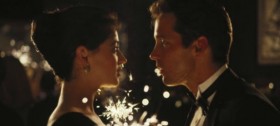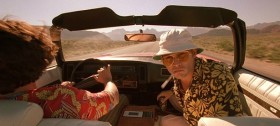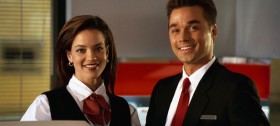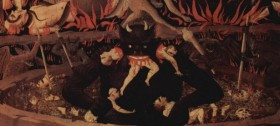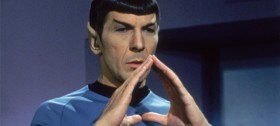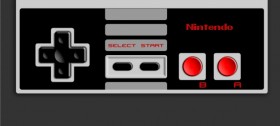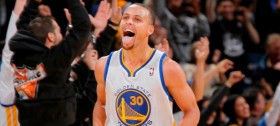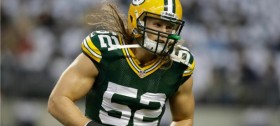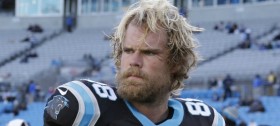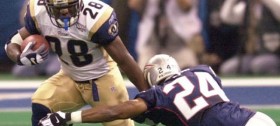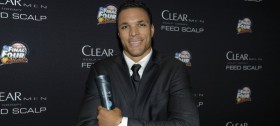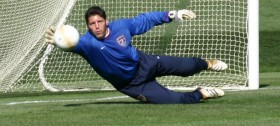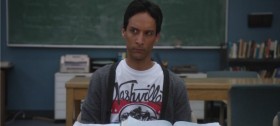Doug Christie Interview
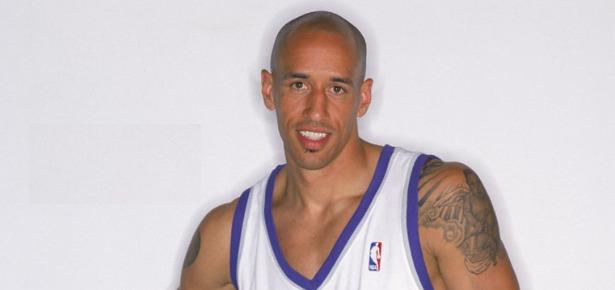
Doug Christie was a ridiculous defender during his 14-year NBA career. Since retiring in 2007, Christie has focused on his charity works, business ventures and his family. Christie home-schools his kids and every year, he and his wife get married on their anniversary – a full blown wedding to celebrate their vows. When he played in the NBA, Christie would signal to his wife countless times each game. A New York Times article published in 2002 detailed the strong bond that the couple shared. Christie and his wife Jackie even wrote a book about their relationship – No Ordinary Love. People like to give Christie shit about how his wife constantly keeps him in check and so on, but when talking to him, Christie sounded like a dude who’s genuinely happy to have such a tight relationship with his wife. When he talks about how important his family is to him, it really comes across as honest and authentic. Christie is a family man and he’s damn proud of it.
Christie and I discussed charity and sports management, married life for NBA players, trash talking, how Kobe stacks up to Michael Jordan and Game 6 of the 2002 Western Conference Finals. Here’s the full interview:
CS: What do you want people to know about the organization you founded last year, Christie Sports Management?
DC: Well Chris, Christie Sports Management is about mind, body and basketball. I train athletes from youth – my son, he’s nine, I train him – all the way to NBA. I trained Matt Barnes with the Lakers. I have an athlete in college at Washington State University, William Ayears. Obviously I love the game, but more than anything learning how to play the game the right way. The mind part of it is understanding how to break down your opponent, thinking the game, understanding clock management and all these different things. And then the body part of it is, you know, guys want to do all these fancy moves, Chris, and do all this stuff. And then you see guys breaking down like Greg Oden with knees and all these different things. But you have to strengthen your body. You have to understand how to move your body. And it’s kind of like martial arts, and the more you learn and understand it, the better obviously you will be.
CS: So now do you have a bunch of different people who help out in this effort or is it really just more of a one-on-one approach where you’re helping these athletes out?
DC: Well, it’s just me. Christie Sports Management is me. I’m the main trainer and I work with them one-on-one. Sometimes we get together in groups. I did a workshop last year in Sacramento where I got together some guys, they were going to Europe – some guys going to Europe, some college guys up in that area – and I worked with them. I had like eight guys. So it just depends. But like with Matt I worked with him one-on-one. William, I worked with him and actually he has a little brother who is in high school in Washington so I work with them together. But most of the time it’s one-on-one so I can really … one of the things I try to do is bridge the gap in communication. Because a lot of the times the coaches nowadays they just say one thing to everybody and you really can’t do that. Everything isn’t for everybody. So the methods that I give to one person, I’m giving somebody else the same message, but I’m giving it to them totally different so that they get it specifically for them.
CS: It’s got to be pretty rewarding when these guys go on to have some success, right?
DC: No question. I think even more than the team success in all of that is the moment of what I call the “a-ha” moment. Like with riding a bike where you get it. And when I’m talking to them and I’m trying to get them to grasp a concept or something, and all of a sudden I see that they got it and it’s like a-ha, that’s probably one of the most gratifying parts of the whole process. Just watching them learn from all the different things that I have picked up from Pete Carril in Sacramento and Rick Adelman to Pat Riley to all the different coaches that I’ve had to pick stuff from. And then all of the studying that I’ve done with the body and different stuff, watching them grasp that is just the ultimate reward.
CS: So to go along with that, your organization places a strong emphasis on mentorship. Did you have many influential mentors when you were first starting out in the game of basketball?
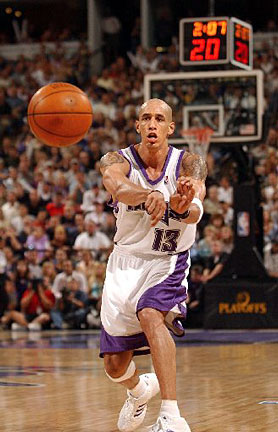 DC: You know Chris, I was actually a soccer player when I was younger and then I picked up basketball and played it all the time. But then when I got organized and played in a group, I think I must have been in like 5th or 6th grade – probably 5th grade – I never looked back. At the time my Mom’s boyfriend needed a basketball player, you know weekend warrior, so I played with him. I would say once I got to Pepperdine – maybe in high school I had a couple. Mr. Williams he was my gym teacher and ultimately the head coach, Glen Smith was the assistant coach there. But Coach Carril was probably one of my most memorable, and Tom Asbury at Pepperdine. Those are probably two of the most influential mentors that I’ve had throughout my years of playing basketball that were really straight shooters. Tom Asbury was like a father and Coach Carril really, I call him Yoda.
DC: You know Chris, I was actually a soccer player when I was younger and then I picked up basketball and played it all the time. But then when I got organized and played in a group, I think I must have been in like 5th or 6th grade – probably 5th grade – I never looked back. At the time my Mom’s boyfriend needed a basketball player, you know weekend warrior, so I played with him. I would say once I got to Pepperdine – maybe in high school I had a couple. Mr. Williams he was my gym teacher and ultimately the head coach, Glen Smith was the assistant coach there. But Coach Carril was probably one of my most memorable, and Tom Asbury at Pepperdine. Those are probably two of the most influential mentors that I’ve had throughout my years of playing basketball that were really straight shooters. Tom Asbury was like a father and Coach Carril really, I call him Yoda.
CS: (laughs)
DC: Because he knew so much about the game, but he breaks it down so simple that it just really makes sense to guys.
CS: You’re also active in various charity efforts. Can you tell me a little bit about the Christie Bridge to Kids Program?
DC: Well Bridge to Kids was started back when I first got to the NBA and more than anything it’s just what it says. I was trying to give back to the community and one of the ways obviously was basketball, because that was my biggest way to give back what I had taken from the inner city of Seattle and it made me able to go to college and a be a professional basketball player. So with the Christie Bridge to Kids, we started a camp and all the kids – it was like 300 a year – and they would come for free. All I asked is that on the last day of camp we’d all grab garbage bags and we would just go around south Seattle, the little area right there where the camp was, and we would just pick up garbage. We’d try to instill in them that there are a million ways to give back. You don’t have to give back monetarily all the time. You can give back in a lot of different ways. My wife and I also have the Infinite Love Foundation and we focus to the less fortunate. We have a club in Seattle that adults – called The Millionaires Club – we’ve helped on Thanksgiving, and we’ve dealt with children’s hospitals and toys. And things right now, Thanksgiving, Christmas, is probably one of our biggest times. Because when we’re there or we present Thanksgiving dinner and turkeys and different stuff, it’s just something that when you’re blessed the way that we have been – not only monetarily but with the love that we have as a family and all these different things – we just try to give back in whatever way possible.
CS: That’s excellent, man. So I’m sure you’ve heard about this whole Tony Parker/Eva Longoria divorce thing and I know you and your wife actually wrote a book on marriage and basketball. Much has been written about how you and your wife maintain a close relationship. From your experience with your own relationship and the relationships of teammates you’ve had over the years, how many NBA marriages really have a chance to survive?
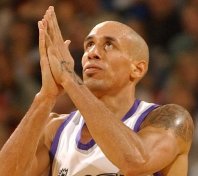 DC: You now I would think Chris that all of them have a chance to survive, but it’s going to be … if you put that to a percentage. then all of a sudden it starts getting into the lower percentages because obviously there’s right now just in America, outside of sports, it’s like 50% of the people who get married get divorced. Well when you break that down even farther in professional sports, where guys are away longer and all these different things that keep pulling at them ,and that probably boils down to into the 30% range. They might make it through the NBA career and then once they’re done and the lifestyle changes all of a sudden they get divorced. But you know my wife and I, a lot of people were saying things to make fun and, you know, I would give her a sign and grab her after the game and all these things. You know, this is my soul mate, my lover, my everything, and I want her to be safe. Because once basketball is done, like it is now, I still have my family. That is the most important thing in my life no question. And you have to make it that way. You’ve got to want to survive in a very competitive world if you want to play professional sports and entertainment and all those things, because so many people are coming at you from so many different angles and care nothing about your marriage and what you have going on. You have to take real extreme measures to make sure you survive in an extreme environment.
DC: You now I would think Chris that all of them have a chance to survive, but it’s going to be … if you put that to a percentage. then all of a sudden it starts getting into the lower percentages because obviously there’s right now just in America, outside of sports, it’s like 50% of the people who get married get divorced. Well when you break that down even farther in professional sports, where guys are away longer and all these different things that keep pulling at them ,and that probably boils down to into the 30% range. They might make it through the NBA career and then once they’re done and the lifestyle changes all of a sudden they get divorced. But you know my wife and I, a lot of people were saying things to make fun and, you know, I would give her a sign and grab her after the game and all these things. You know, this is my soul mate, my lover, my everything, and I want her to be safe. Because once basketball is done, like it is now, I still have my family. That is the most important thing in my life no question. And you have to make it that way. You’ve got to want to survive in a very competitive world if you want to play professional sports and entertainment and all those things, because so many people are coming at you from so many different angles and care nothing about your marriage and what you have going on. You have to take real extreme measures to make sure you survive in an extreme environment.
CS: So how have you and your wife maintained such a strong relationship over the years?
DC: You know my wife would – I told her “if you want to come with me you can travel on the road with me,” and people would say “hey your wife follows you everywhere”. But this was … we got married in ‘96 and we were building the roots and the strength of our relationship. So yeah, come with me. Let’s have fun. So we would be able to go and watch movies, and obviously the kids were at home with Mom, so if we wanted to have wild sex we could do whatever we wanted to do.
CS: (laughs)
DC: We were just having a good time, and I think that is the basis. A lot of guys leave their families at home or whatever and there becomes a wedge in there. We just totally stayed strong, and at the same time, when we were travelling, we were staring businesses. And all of those fruits now are coming to fruition with the different things from publishing companies to record companies, clothing, all the different things that we have going on we would set the table and plant the roots for all that stuff when we were on those trips and talking on the phone all the time.
CS: Gotcha. So let me ask you a few quick basketball questions. Who’s the best offensive player you’ve ever defended?
DC: I would say the best was Michael Jordan, hands down. Just a total juggernaut of an offensive player – always on attack, looking for any small weak spot in your defense and taking advantage of everything that he is given. He can shoot the ball from the 3 pointer, shoot the ball mid-range, he can dribble and pull up, finish with a dunk, finish with either hand, incredible free throw shooter. So you know man, incredible.
CS: You’ve also gone up against Kobe Bryant on multiple occasions. How do the two compare and do you think Kobe will ever be able to challenge Michael Jordan’s status as the greatest player of all time?
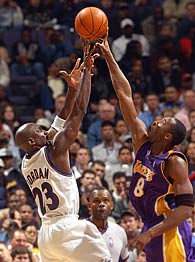 DC: I would say that these are two of the most ultra competitive alpha males that I’ve ever competed against. The comparisons are easy to make because they were both coached by Phil Jackson. Also both have had tremendous success in his system. Michael and Kobe are both ultra aggressive offensive players as well, and they have very similar offensive games. I would give the nod to Michael Jordan’s post-game though. And I would have to say that on the defensive side of the ball, they are both extremely competitive. People don’t understand that this is really one of the main reasons that made Michael so dominant. He not only dominated the offensive end of the court – averaging 30+ points per game – but he also dominated his man on the defensive side of the ball. This is really unprecedented. It’s hard to compare the greatness of Michael Jordan to any wing player like Kobe, Lebron, D-Wade etc., because Michael Jordan revolutionized the game for these types of players. They’ve all had the benefit of learning and being able to pattern their game after arguably the best player that’s ever played the game. In saying that, if Kobe – without Shaq – was to win six championships, then there is going to be serious conversation about the Kobe and Michael Jordan comparison.
DC: I would say that these are two of the most ultra competitive alpha males that I’ve ever competed against. The comparisons are easy to make because they were both coached by Phil Jackson. Also both have had tremendous success in his system. Michael and Kobe are both ultra aggressive offensive players as well, and they have very similar offensive games. I would give the nod to Michael Jordan’s post-game though. And I would have to say that on the defensive side of the ball, they are both extremely competitive. People don’t understand that this is really one of the main reasons that made Michael so dominant. He not only dominated the offensive end of the court – averaging 30+ points per game – but he also dominated his man on the defensive side of the ball. This is really unprecedented. It’s hard to compare the greatness of Michael Jordan to any wing player like Kobe, Lebron, D-Wade etc., because Michael Jordan revolutionized the game for these types of players. They’ve all had the benefit of learning and being able to pattern their game after arguably the best player that’s ever played the game. In saying that, if Kobe – without Shaq – was to win six championships, then there is going to be serious conversation about the Kobe and Michael Jordan comparison.
CS: Who’s the biggest trash talker you’ve had to go against?
DC: Trash talker… I would probably say it’s between two guys. Probably Reggie Miller and Kevin Garnet, those two guys were trash talkers. And Kevin, I don’t even play his position, but he’d more or less be talking to himself at the same time, but he’s talking trash to everybody else too.
CS: (laughs)
DC: Reggie you know he was talking trash to me, because I was guarding him one-on-one, but both of those guys were pretty good at it.
CS: Now on a scale of 1 to 10, how rigged was Game 6 of the 2002 Western Conference Finals?
DC: Oh man! You know, I would say 10…
CS: (laughs)
DC: But then I’d preface that by saying, I would truly hope that … and truly in my heart of hearts I believe that didn’t happen. Because as bad as it hurts in the different phases when I look at the game and I just go “what the hell is going on?” I truly don’t believe something like that could go on. It would hurt my heart of hearts because I love the game of basketball and I played totally fair with all my heart, everything. That would be crushing.
CS: All right man. So you think they’re doing a good job of cleaning that stuff up now?
DC: I think they’re doing a terrible job with changing the rules constantly. The trash talking thing, that is just totally – that’s part of the game. That’s part of what the ref’s have to monitor in the game. If a guy’s getting out of hand, well give him a technical. But every guy who raises his hand who says something, you give it to him, that’s totally crazy. In the late 90s, when they started changing… every year the rules change. It was messing up the game, ‘cause now guys are out there thinking and what’s sad is you’re taking away from the most beautiful essence of the game. You’re not able to play your best when you think. It’s not a thinking game. You do have to think, but that’s molded in practice. You don’t want to be out there thinking “oh hell what do I do?”And they were, you know, you can’t put your hand on guys passed this point or this point. The game is the game, and the refs have to adjust to reffing the game and not putting road blocks and stop signs up so that a ref doesn’t have to do his job. I don’t think that anything of the things that they’re doing right now are really helping the game.
CS: Gotcha. So just to boil it down to its real essence, what do you love most about the game of basketball?
DC: You know, the team aspect is… you know it’s not the individual first, but just the team aspect, the camaraderie of the guys, watching something collectively come together. Then when you start training camp or early practice in high school and all these different things, you’re getting to know guys and then all of the sudden things start clicking. That is the ultimate beauty. But as an individual, the game of basketball is just… for me I love soccer, but the game of basketball is just the most beautiful game that there is. Because you have to learn so many different facets, it reminds me a lot of ballet. But at the same time you’ve got tap dance and you’ve got jazz, you’ve got hip hop. You get everything when you watch the game of basketball. In football, they’ve got the helmets on. In baseball, you’re kind of far away. In basketball, the guys are right there, you can see them. You’re very close to the action. From the passing to the defense, just all the different facets of the game… it’s truly why I just love it.
Related Posts
| Print article | This entry was posted by Chris Stout on November 23, 2010 at 9:01 am, and is filed under Sports. Follow any responses to this post through RSS 2.0. Both comments and pings are currently closed. |
Comments are closed.

